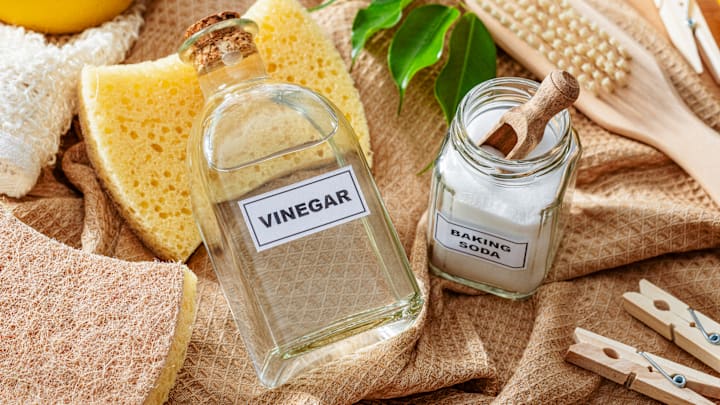Vinegar can be the unsung hero of home cleaning: A simple solution of equal parts white vinegar and water can go a long way towards removing stubborn stains, cleaning and descaling coffeemakers, or washing windows around your home—all for a fraction of the price of brand-name cleaning solutions.
But just because you can use vinegar to clean some household items doesn’t mean you can use it on every household item: You run the risk of damaging them instead of cleaning them—which just creates more work for you. Below are a few things you’ll want to avoid cleaning with vinegar.
- Washing Machines
- Grout
- Egg Stains
- Marble Countertops
- Wood Floors
- Knives
- Stainless Steel
- Irons and Steamers
- Phone, TV, and Other Tech Displays
Washing Machines

It’s not a good idea to use vinegar in your washing machine: Per Whirlpool, which manufactures the machines, vinegar’s acidity may corrode the device’s components. You can use vinegar to pre-treat stains on white fabrics, though—just make sure to wash it out before you toss them in the machine.
Grout

While many websites recommended using vinegar to clean grout, professionals in the field advise against it, particularly if the grout isn’t sealed: Over time, vinegar can damage and erode it.
Egg Stains

Dropping an egg on your kitchen floor isn’t the end of the world, but according to Good Housekeeping, using a vinegar solution to clean it up is a no-no: The acid in the vinegar may cause the egg yolk to congeal and make the job more difficult.
You Might Also Like ...
- 10 Surprising Things You Shouldn’t Put Down Your Drain
- You Might Be Surprised at the Number of Smoke Alarms You Need in Your Home
- 10 Fall Cleaning Tasks You Don’t Want to Forget This Season
Add Mental Floss as a preferred news source!
Marble Countertops

If you have countertops in your home made from natural stone like limestone or marble, then keep vinegar far, far away. “Acids are the enemy of any stone but especially marble, which is a softer stone and more porous,” Welberson DosSantos of NYC Marble Care told Architectural Digest. “Acids react with the calcium carbonate and eat away at the stone.” Instead, using a gentle and non-abrasive cleaning solution, like water mixed with mild dishwashing soap.
Wood Floors

Vinegar can strip hardwood surfaces like floors and furniture, and diluting it doesn’t help; the acid can break down the waxy finish and, in the words of Consumer Reports, “leave it looking cloudy, dull, or scratched.” And as Good Housekeeping notes, you should also avoid using vinegar on unsealed wood because it could make it swell up. Instead, use cleaners that are specifically made for hardwood surfaces.
Knives

The internet is rife with stories saying it’s fine to clean your knives with vinegar, but both Consumer Reports and House Digest recommend against it: Vinegar may leave your knives with pitted edges and maybe even damaged finishes. Kitchen knives should be cleaned with mild dish soap and warm water to keep those edges sharp, which is important for cutting and slicing foods.
Stainless Steel

Skip using vinegar on stainless steel: According to Therapy Clean, the material “is protected by a thin passive layer of chromium oxide that gives it its resistance to corrosion. Acids like vinegar can break down that protective layer over time, especially when left sitting too long.” To get rid of food splatter and greasy smears, use dedicated stainless steel cleaners or dish soap instead.
Irons and Steamers

Some people put vinegar inside of their irons or garment steamers— not to clean clothes or help smooth out wrinkles, but to clean the devices themselves. It’s believed that running distilled white vinegar through an iron or steamer could dissolve the mineral deposits left inside.
Although vinegar does get rid of mineral deposits, it could also damage the internal components of the devices, which may lead to them never working correctly again. Carolyn Forté, Home Care & Cleaning Lab executive director at the Good Housekeeping Institute, recommends “fill[ing] the water chamber of the iron or steamer, set[ting] it to the highest temperature and steam setting, and blast[ing] away to flush out trapped minerals.”
Phone, TV, and Other Tech Displays

It may be tempting to clean your smartphone with vinegar, or all-purpose cleaner with vinegar as an active ingredient, but it’s not recommended: The acids in vinegar may corrode the anti-glare coating or protective layer on touchscreen devices. This would make your smartphone (and other tech) less responsive over time and eventually render it useless. It’s best to clean tech displays with microfiber cloths and computer screen cleaning spray. You can also use cleaning wipes that were specifically designed for electronics.
